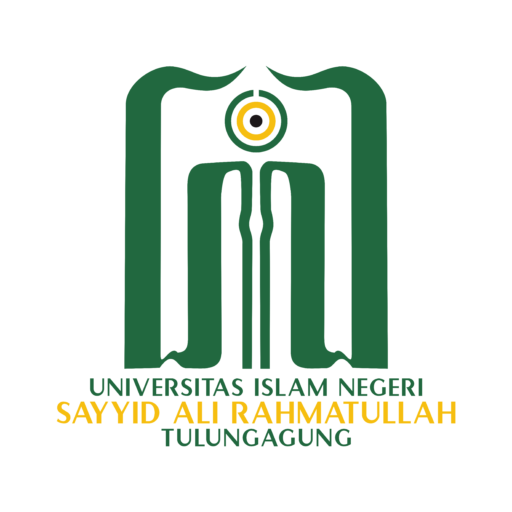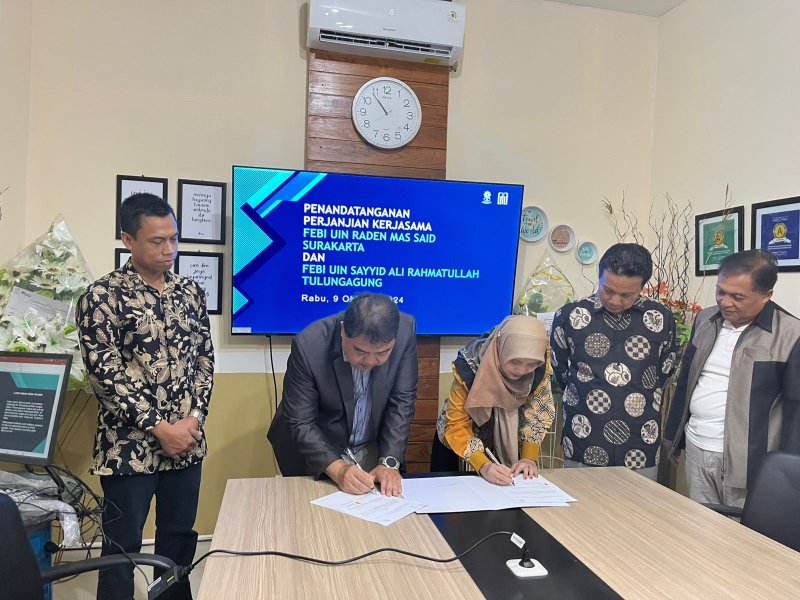On 9 until 10 October 2024, Faculty of Islamic Economics and Business (FEBI) State Islamic University (UIN) Sayyid Ali Rahmatullah Tulungagung signed the Memorandum of Agreement (MoA) with FEBI UIN Raden Mas Said Surakarta. The event which took place at the FEBI UIN Raden Mas Said campus was attended by Dr. Chusnul Chotimah, M.Ag as Dean of FEBI UIN Sayyid Ali Rahmatullah, and Prof. Dr. Rahmawan Arifin, M.Si., as Dean of FEBI UIN Raden Mas Said Surakarta. Apart from the two faculty leaders, Also present was the Deputy Dean 1 (D. Qomarul Huda, M.HI), Deputy Dean 2 (Dr. Mashudi, M.Pd.I), and Secretary of the Economics Department (Risdiana Himmati, M.Si) from FEBI UIN Sayyid Ali Rahmatullah, which is an important part of strengthening cooperation between the two institutions.
The MoA signed by both parties is a strategic initiative aimed at expanding academic and research collaboration between two leading Islamic economics faculties in Indonesia. This collaboration is based on the implementation of the Tridharma of Higher Education, which includes educational development, study, and dedication to the community. These three aspects are the basis of collaboration which is expected to improve the quality of education and relevance of research results as well as greater social contribution from each faculty.. The signing of this MoA took place with a sense of togetherness and commitment to increasing academic capacity. Dr. Chusnul Chotimah, in his speech, said that this collaboration was an important step in facing the challenges of globalization in the world of education, especially in the fields of Islamic economics and business. According to him, Collaboration between institutions like this not only has a positive impact on curriculum development and learning methods, but it can also open up opportunities for collaborative research relevant to the needs of industry and society. He also hopes that this collaboration will be able to create new innovations in the field of sharia economics that will contribute to community development, both locally and nationally.
Meanwhile, Prof. Dr. Rahmawan Arifin, M.Si., emphasized the importance of synergy between institutions in creating a stronger educational ecosystem. He highlighted that the challenges in the field of Islamic economics are currently increasingly important apart from education and research, Devotion to the community is one of the important pillars of this MoA. Both parties are committed to designing and implementing service programs whose benefits can be directly felt by the community. It is hoped that these service programs can encourage community economic empowerment through a sharia approach, as well as increasing financial and business literacy among micro business actors, small, and secondary (MSMEs). Including UIN Raden Mas Said Solo's experience in managing community service through the Student Mobility Program, Summer Class for international students is also a reference for implementing collaboration in the field of community service. This activity also reflects a major step in strengthening academic networks between universities in Indonesia, especially in the fields of Islamic economics and business. With this MoA, It is hoped that a solid collaborative network will be formed between the two universities, which can later be expanded into collaboration with various other institutions, both at home and abroad. This collaboration, eventually, It is hoped that it can have a significant impact in developing academic capacity, at the same time making a real contribution to the development of a sharia-based society.plex economy and requiring a collaborative approach. Through this collaboration, Both faculties can learn from each other and share experiences in developing academic programs that are more adaptive to current developments. He also said that the joint research that will be carried out as part of this collaboration is expected to produce findings that are useful not only for the academic world, but also for stakeholders in the field of Islamic economics, good from the government, business sector, to the wider community.


